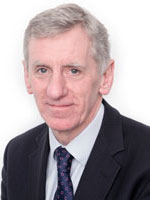 |
| NICE CEO Sir Andrew Dillon |
The U.K.'s cost-effectiveness watchdog has recently sounded a bit like a broken record when it comes to its cancer drug rejections. The latest to get a "no-go" from the gatekeeper? Celgene's ($CELG) Imnovid.
The National Institute for Health and Care Excellence (NICE) has shot down the New Jersey biotech's third-line multiple myeloma treatment in preliminary guidance, claiming the company didn't provide sufficient evidence of the drug's effectiveness compared with current care, PharmaPhorum reports.
NICE CEO Andrew Dillon said he was disappointed not to be able to recommend Imnovid, claiming in a statement that "Celgene's own cost-effectiveness analysis clearly demonstrated that the drug does not offer enough benefit to justify its price." And NICE already recommends drugs like Celgene's own Thalomid (thalidomide) and Revlimid (lenalidomide), plus Johnson & Johnson's ($JNJ) Velcade (bortezomib). All three can slow myeloma's progression and help relieve symptoms, he noted.
It's a stance NICE has taken more and more frequently lately amid a tide of pricey new cancer drugs. While its decisions have sparked public outcry, Dillon has pinned the problem on the price-setters themselves: drugmakers. The NHS isn't "a bottomless pit," he told the Financial Times this summer. "[W]e shouldn't mislead ourselves into thinking that there is some world we will reach ... where everything that could conceivably make a difference to us, whatever its price, is going to be available."
Celgene itself has been in this position before: NICE initially turned down the company's sales superstar, Revlimid, in myelodysplastic syndromes, and it took a so-called patient access scheme (read: discount) to change the U.K. body's mind this August.
The company may have to get to work on a similar scheme if it wants to stay on track with some lofty sales goals. By 2017, Celgene figures it will be reporting net sales of $13 billion to $14 billion--more than twice its 2013 total. And it expects its cancer drugs to power the jump.
- get more from PharmaPhorum
Special Report: The 25 most influential people in biopharma today - Sir Andrew Dillon